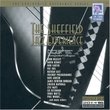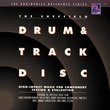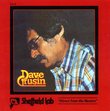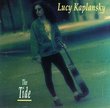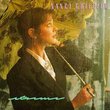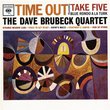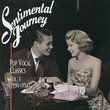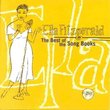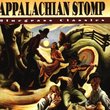| All Artists: Harry James Title: King James Version Members Wishing: 1 Total Copies: 0 Label: Sheffield Lab Release Date: 10/25/1990 Album Type: Import Genre: Jazz Style: Swing Jazz Number of Discs: 1 SwapaCD Credits: 1 UPC: 014391000327 |
Search - Harry James :: King James Version
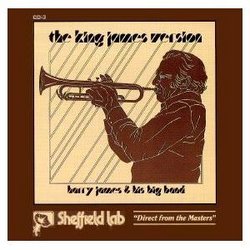 | Harry James King James Version Genre: Jazz
Henry Haag "Harry" James (March 15, 1916 - July 5, 1983) was an American musician and bandleader. James was an instrumentalist of the swing era, employing a bravura playing style that made his trumpet work identifiable. He... more » |
Larger Image |
CD DetailsSynopsis
Product Description Henry Haag "Harry" James (March 15, 1916 - July 5, 1983) was an American musician and bandleader. James was an instrumentalist of the swing era, employing a bravura playing style that made his trumpet work identifiable. He was one of the most popular bandleaders of the first half of the 1940s, and he continued to lead his band until just before his death, 40 years later. Similar CDs
Similarly Requested CDs
|
CD ReviewsHarry James in his BEST FORM! F. Barton | Newport, WA USA | 06/04/2000 (5 out of 5 stars) "This is one of THREE albums that were made by Sheffeld Labs in the late '70s. Remember quadraphonic sound? Well this was a late '70s invention, called Direct-to-disc, which was supposed to, and DID, remove the hiss associated with analog tape. However this phase soon was over with as the recorded product was too expensive to purchase!Here we have it ALL! Those glorious sessions, which were recorded LIVE. "Corner Pocket" a Count Basie favorite is tremendous, as is "Don't Be That Way", mainly associated with Benny Goodman. There's even a cover of "Traces", which was a hit for the Classics IV. The sound is INCREDIBLE, and the entire band is top-notch. I've listened to these three releases a LOT, and encourage you to get them while they are still in print. They are not likely to remain so. You will be forever glad you did!" Harry James is the greatest! Sheffield was no slouch either. S. Baird | Baton Rouge, LA United States | 05/01/2006 (5 out of 5 stars) "Sheffield Labs resurrected the direct-to-disc process in the early seventies because they felt that by eliminating the master tape step they could get their customers just that much closer to the music. The "D-to-D" process had been used in phonograph recording prior to the advent of the tape recorder, and, in fact, it was inventor, Thomas A. Edison, who first used it. But unlike the magnetic master tape, there are other circumstances that moved the commercial recording companies away from the process. Principal among these was the inability to edit a recording. If a mistake were made, the recording had to be discarded and restarted anew. Also, since a direct-to-disc "mother" could not be cloned, the number of acceptable quality copies that could be stamped was limited. Sheffield often operated several disc cutting lathes (as they did for this recording) simultaneously in order to produce a large enough number of records to satisfy demand yet still retain the high audio quality for which they were famous. In other instances they recorded several different "takes." The King James Version was, by no means, the first of their "D-to-D" releases, but it was the first to receive wide acclaim outside the audiophile community. Two more Harry James were to follow shortly, Comin' From A Good Place (my personal favorite) and Still Harry After All These Years.
All three of these titles were transferred to CD, and came from safety backup magnetic tape sources that were made at the original recording sessions. Some audiophiles maintain that the best way to hear these are on the original D-to-D LPs, but from my experience, these are very close. The original CD releases came at the dawn of the digital era, with CD booklets that looked exactly like the album jackets. A later reissue series was produced some years later with different artwork (as pictured on this page). These later reissues incorporated the newer 24 bit recording process known as super bit mapping. As for the music itself, it needs no introduction to lovers of music from the swing era. You'll find Harry in top form on all three of these, and all are highly recommended." |

 Track Listings (9) - Disc #1
Track Listings (9) - Disc #1